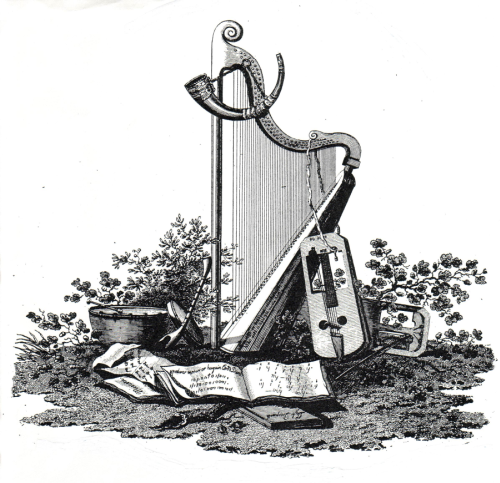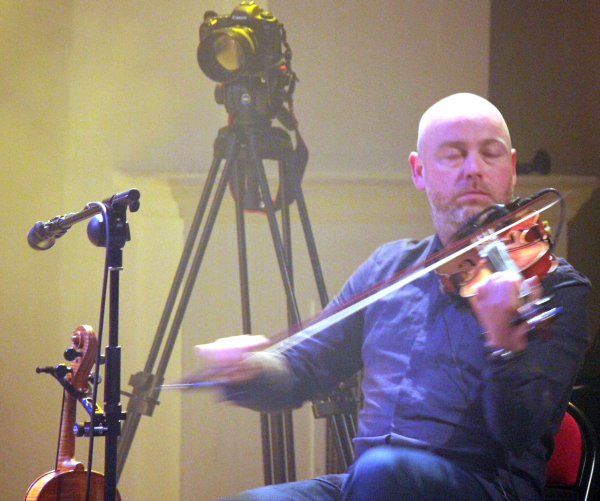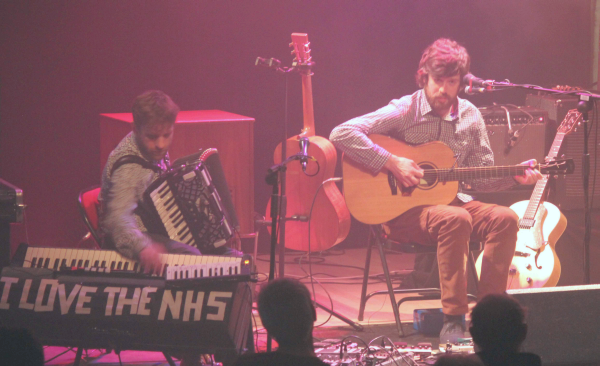|
|
Gwerincymru — o Gymru o’r byd |
|||||
|
The mighty band Lau play WOMEX at the end of October. IAIN CAMPBELL talks to spectacular West of Scotland fiddler Aidan O’Rourke, Orkney guitarist Kris Drever and East Anglian keyboards/accordion player Martin Green.
I spent an enjoyable hour exploring Lau’s approach to music in a warm, friendly and very loose interview as they when they played in Cardiff at The Gate arts centre in Plasnewydd.
I started by exploring the statement, published on their web site, that they had formed while sitting around a table - suspecting that there was more to it than that. Kris Drever explained: “We had become friends. We were developing different musical ideas in pairs - accidentally three duos. Do you remember when the decision was made?”
Martin takes up the story: “You and Aidan had already recorded together, and we were ready to record together. I did a gig and Aidan was around; he came and did a bit, and at that time we thought it would be good to do something else and we were talking about Kris straight away.” So, not quite just sitting round a table - but pretty close.
Martin continues: “All three of us were drawn to Edinburgh for its progressive folk scene. We were all listening to Swåp, Easy Club, Simon Thoumire and those sort of forward-thinking folky bands. Moving up from England, I found that there was a whole way of thinking going on in sessions there; sessions that just sort of melt down in the middle and disintegrate and then reappear as a coherent tune, with a mild chaos, which is definitely something that Lau have embraced. I don’t think any of us would claim that we created that I just think that is the spirit of Edinburgh, or perhaps Scotland.”
We move on to discuss another statement: that it took a year of rehearsal before they set out on the road. Kris, again: “Yes, a lot of it was just trying to shape everything right”. Martin adds: ”We were all working full-time in other bands, which was quite nice, because we could have focussed daytime sessions.”
Their latest album, Arc Light, had just been released. I asked them why they had approached Tucker Martine to produce it. Martin explains: “We all loved the sound of some of the records that he had made. There has to be someone that we unanimously agree on as a captain. It is very strange experience to have someone come in and take control of the band. If you don’t have that unquestioning respect for what he does, then it would be a disaster.” Kris adds: “There is always a bit of a gamble with a producer that you’ve never met. As it transpired, Tucker got on with everybody; he was a member of the band within an hour of us meeting him.”
I suggest that he understood where they were going musically. Kris responds: “Yeah, but part of it is social too. It’s all very well understanding the mechanics of someone’s music, but if you don’t get on with them - well it’s such an intense environment, to be locked away for a week or so with someone you don’t like. But he’s a lovely, lovely man.”
“He’s very quick and astute,” Martin adds. “There’s always the possibility to lose confidence in someone. It’s all quite fragile, anyway; and to say to someone that you think that they should do it again because it wasn’t quite good enough takes an amazing 0-60 empathy. He did have something of the ‘doctor’ - we were all quite happy, figuratively, to stand naked in front of him.”
I ask whether his input will have a lasting effect. Martin reflects: “The experience will have a lasting effect, but we couldn’t say now that the next record will be with Tucker. We’ve worked with great producers and found them all very inspiring. You take away a little of them. Even if we do something musically different, there’s a memory about their way of working that keeps knocking the sides of what you think is possible.”
Kris says: “It was timely having Tucker. We produced the closest thing to sounding like what we hoped it would sound like.” Martin expands: “One of the shifts has been that he’s thinking about the sound a lot more. When we made the first album we were thinking about notes a lot…” “...And shape and feel,” Kris continues the thread (although there is so much agreement between them that it’s like hearing a single voice. “There is a lot of stuff that is musically very technical and intricate on the first albums. Recently they have been making music that involves more space and fewer notes.” Martin concurs: “Definitely, fewer notes.” Kris points out: “There are still a lot of notes, mind, but it’s good to have variation in your musical output. Overall, It felt like a natural process. Some of that is to do with being a bit older and having spent a bit of time in studios. You don’t feel the pressure in the same way.”
In between their studio albums, they have released a couple of collaborative EPs with Karine Polwart and Adem Ilhan, (a musician of Turkish descent from South London, currently bass guitarist in the post-rock band Fridge.) These have a very different sound; as Kris explains: “They were interesting. We did not have a lot of time to prepare. They are not as detailed, or in the Lau style; it’s almost as if we’re a different band.” He goes on to explain their importance for the development of Lau: “They’re fantastic - it’s like they’re little palate cleansers for our songs. We always end up with some material from those collaborations that we want to play in concerts. It’s a great thing to do between albums; it keeps the concerts fresh.”
“Yes - what we do is very rehearsed and not having much time makes the music looser and more relaxed,” Martin adds. Kris continues: “They sometimes have a raw edge, which is something we all take great delight in listening to in other people’s music - and the only way to get an authentic raw edge is to do it quickly, or play an instrument that you don’t know how to play.”
We carry on talking further about external influences on their sound. Martin reflects: “As a band, we end up as a unit in different situations. We went out the other day and had a jam with some electronic musicians, Hacker Farm. We were one noise and they were another noise, and learning to be one noise was really good. It was a box of delights.” I ask if they are going to continue with these collaborations. There is some laughter as they both respond quickly: “Yes”. Martin continues: “It’s one of the things we love as a band. We’ve just done something with Scottish rock band Frightened Rabbit for their new EP. We’ve lots of other ideas of what we might do collaboratively.” Kris adds: “We did a pop-up festival appearance with Abigail Washburn, which was great – it wetted all our appetites to do something more with her. That sort of thing helps intra-band relationships, because you move outside of the bubble and play music with other people who have other ideas.”
As calls come in for assistance in the auditorium, the personnel switches. I take the opportunity of talking with each of them individually about their work outside of the band.
They are all very busy. Kris is hoping to do another solo album, and has just released a duo album, Storymap, with Eamonn Coyne - which, incidentally, is really good. There is some talk of another with Roddy Woomble and John McCusker: “We really enjoyed doing Before The Ruin, but we all had too many irons in the fire to make it a permanent band. As an occasional collective, I think it’s a good thing. Having different musical experience with different people can freshen you up and give you new ideas.”
Martin, too, has a varied agenda: “I have the Martin Green Machine, and at the moment I’m touring a show, Crow’s Bones, about ghost songs commissioned by Opera North. The singers are Inge Thomson and Becky Unthank - they have both got quite spooky, ethereal voices - and a nyckelharper, Niklas Roswall. It’s been great working with a theatrical company, because their whole approach to staging is different. How things look is very important to them and they focus on one aesthetic - scariness, in this case. They then present that through lighting, film and other effects, as well as the music.”
Aidan also plays alongside Brian Finnegan, James Goodwin and Ian Stephenson in the quartet, Kan. This keeps him busy, although he says: “Most of my time is spent with Lau at the moment.”
One of the defining features of Lau is their use of electronic effects, which has increased as the band has developed. Martin Green is a noted promoter of them, and so I venture: “You make no secret of the fact that you like the electronic effects.”
“No, I love it, absolutely love it,” he exclaims with a big grin. “My brother Owen is an electro-acoustic composer, and he’s very ‘Hacker’s Farm’ in his ethos. While I was out with my Dad and Morris dancers, he was back at home wiring the channels of a four-track into themselves - he taught me an awful lot about music.
“I suppose that if it hadn’t been for Owen, I wouldn’t have encountered that world in that way. My folk existence was my drive for a long time. He showed me a lot of things, and it turned into this love of sound.”
Martin is so passionate about this aspect of his music that there is no need to wind him up. “One of the things about electronic music that is very exciting for me is making new sound,” he says. “I can get as good as I like at the accordion, but unless you modify the instrument yourself, you’re not going to make a sound that the world has never heard. Within electronics, those possibilities are there, and trying to find where they fit.
“I do an electronic thing on my own, which needs to have no boundaries; but trying to find where it fits in Lau or other traditionally-based music is much harder.
“Fusions are a dangerous business; so it’s slow progress. There are a lot more electronics in the show now, and I hope it marries well. It certainly feels okay from the stage. As processors get faster in computers, what you can do in terms of real-time manipulation and the playability of these things, how fast you can control them makes them more and more like acoustic instruments - and that makes it an exciting time for electronic music.”
I ask if there is an openness in Scotland for this type of music. “Oh yes, absolutely,” he says. “An openness in general, actually. There are people everywhere with a broad interest. What the Scots have, which I love and find very inspiring, is a belief in the strength of their traditional music. The evidence of this is all over because it is so popular in Scotland. Consequently, there is no need to be precious. Nobody is worried that it’s going to buckle and break - that gives them a confidence to twist it and see what happens without anybody getting worried. Scotland’s a pretty progressive country.”
He’s definitely on a roll now: “Take Aidan, as an example, he had a pretty hardcore traditional upbringing on the West coast. That music is so grounded in him, it’s so much part of how he plays that whatever other interest he explores along the way cannot disturb that foundation.” He pauses momentarily before continuing. “In some way I think that the whole of Scotland is like that. They’ve done such a good job of teaching and being proud of their music that there is a sort of fearlessness about where you might take it. One of the things that is great about Scotland, as an Englishman, is that if you want to come to Scotland and play Scottish music that’s great - welcome to the party.”
I continue exploring this theme with Aidan: “We have introduced it incrementally - I started with an octave pedal, just to increase the range, so I can go one or two octaves lower or higher. It adds more dark colour to the tracks and widens the palette in general. Later, I added a looper and a delay.
“But they’re not something you can just add and all of a sudden you have it. I’ve been using them for a few years now. The more you use them, the more their use becomes second nature. It’s amazing how you learn them like an instrument and it becomes instinctive - I now turn up at a gig with my fiddle and my flight case of effects.” But he has not abandoned the traditional role of musician with a fiddle sitting down to play: “I can still do a gig with no amplification at all, and I love that. I did it recently in Ireland, at an international fiddle concert, playing solo with no effects. I love that, and I love hardcore Scottish traditional music - but my instrument is more often now my fiddle and these effects. It’s quite a basic set-up, though - nothing compared to what Martin’s using.
“I enjoy it; and because we’ve introduced it a little at a time, we’ve become quite expert with it and at knowing where it fits into our sound.”
I next talk to Kris about his use of effects. “I have the least effects in the band. Guitar players normally have the biggest pedal boards. I think it’s nice to turn that on its head. I have an overdrive pedal, a tremolo pedal and a loop pedal - I loop some vocals. I’m mad for it though, the bigger the range of noises we can make the better for us.” There are musical reasons for his relative simplicity as he explains, “Martin uses my octave pedal on his left hand and that works fine. Martin and I tend to play the same bottom line. That was one of the first musical decisions we made as a band; we’d try and link the left hand of the accordion and the bottom two strings of the guitar to create a big noise. Having both of us dropping an octave would make it murky I think.”
Where is Lau going? Aidan replies: “We’ve just been commissioned to write a new piece, Lau plus a string quartet, for the Commonwealth games next year. It will be premiered at Celtic Connections. We develop things slowly and in great detail, so the more time we can spend on it, the better. It’s a process that we’ve become less and less frustrated with. It’s the way we work, our method, and it always has good results. We just have to be patient with it and let the ideas mature.”
“Most things end up with roughly the same shape. It might seem completely improvised and wild. The notes within a time period may be improvised but we know that on a cue there’s a get out. It’s pretty much structured, although there’s lots of improvisation within set periods of time. We never completely let go.”
|
||||||



